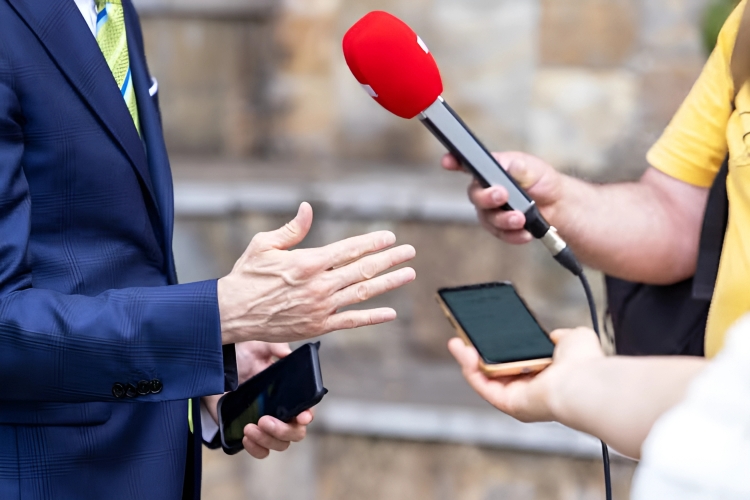In the dynamic world of public relations and media outreach, having access to journalist contact information is important. This knowledge empowers businesses to secure press coverage and build meaningful relationships with the right journalists.
VH Info, a leader in SaaS link-building strategies, emphasizes the importance of understanding how to effectively gather and utilize these contact details to enhance media outreach efforts.
Why is Journalist Contact Information Important?

Journalist contact information is vital for any organization aiming to gain media coverage. By reaching out to relevant journalists, companies can ensure their stories are shared with the right audience, increasing their visibility and credibility.
Ways to Use Journalist Contact Details
- Media Pitching: Tailor pitches to journalists who cover your niche.
- Building Relationships: Foster ongoing communication with journalists for future opportunities.
- Press Coverage: Secure articles or features in well-regarded publications.
How to Find Journalist Contact Information?

Finding journalist contact information can be challenging, but several methods can simplify the process:
- Using Online Directories: Online directories are a valuable resource for accessing journalist contact details. Websites like MuckRack and Roxhill offer comprehensive databases that list journalists’ email addresses and social media profiles.
- Using Social Media Platforms: Social media platforms like Twitter and LinkedIn are excellent tools for finding journalist contact information. Many journalists share their contact details in their bios or posts, making it easier to reach out directly.
- Checking News Websites and Publications: Many news websites and publications provide contact information for their journalists. Checking the “Contact Us” or “About” sections can yield useful details.
- Networking and Press Events: Attending networking events and press conferences offers opportunities to meet journalists in person. Building relationships face-to-face can lead to more personalized interactions later on.
- Checking Media Databases: Media databases like Prowly provide extensive lists of journalist contacts. These platforms often offer free trials, allowing users to explore their resources before committing.
- Using Email Finder Tools: Email finder tools can help locate a journalist’s email address when it’s not readily available. Tools like Hunter.io can be particularly useful in this regard.
Best Practices For Reaching Out to Journalists

Reaching out to journalists effectively requires a thoughtful approach.
Here are some best practices to consider:
Creating a Professional Email
A professional email should have a clear and engaging subject line to grab the journalist’s attention.
Start with a concise introduction, explaining who you are and why you’re reaching out. Make sure your email address is professional, and avoid using your personal or work computer for sending mass emails, as this can lead to spam issues.
Personalizing Your Message
Personalization is key to standing out. Reference the journalist’s recent articles or specific interests to show that you’ve done your homework. Tailor your media pitch to align with their niche, ensuring it’s a good fit for what they typically cover.
This demonstrates respect for their work and increases the chances of getting a response.
Avoiding Common Mistakes
Avoid common mistakes like sending generic emails or contacting irrelevant journalists. Ensure your outreach is targeted and that your message is relevant to the journalist’s beat.
Additionally, steer clear of sending attachments without prior consent, as this can trigger spam filters and reduce the likelihood of your email being read.
Tools and Platforms to Access Journalist Contact Information

Accessing journalist contact information is essential for effective media outreach.
Here are some key tools and platforms that can help streamline this process:
Media Databases
- Roxhill: Roxhill is a comprehensive media database that provides accurate contact details for journalists, broadcasters, bloggers, and podcasters globally. It allows users to build contextual media lists, distribute press releases, and analyze engagement. With features like social media analysis and journalist alerts, Roxhill helps users engage more effectively with relevant journalists, ensuring better press coverage.
- MuckRack: MuckRack is another robust media database that simplifies finding journalist contact information. It allows you to search for journalists by name, outlet, or topic and provides real-time updates on their recent articles and social media activity. MuckRack’s dynamic media lists automatically update as contacts change roles or outlets, saving time and ensuring your outreach is always relevant.
PR Software Solutions
- Cision: Cision is a powerful PR software that offers extensive features for media relations. It includes tools for searching influencers, creating targeted media lists, and accessing editorial calendars. Cision also provides insights into what journalists are currently discussing on social media, helping you tailor your pitches effectively.
- Prowly: Prowly integrates various PR activities into one platform, including a global media database with over a million contacts. It offers tools for creating press releases, managing contacts, and monitoring media coverage. Prowly’s user-friendly interface makes it easy to send personalized emails to journalists and track campaign performance.
Free Resources For Finding Contacts
For those seeking cost-effective solutions, free tools like Hunter.io can be invaluable. Hunter helps identify email address formats for any domain, allowing you to deduce journalists’ email addresses based on their organization’s naming conventions.
Additionally, using Google search with specific operators like “site:” can help locate publicly available contact details on news sites or personal blogs. These methods are particularly useful for small businesses or startups looking to expand their media reach without significant investment in paid databases.
For startups looking to enhance their visibility through SEO and outreach strategies, resources like SEO for Startup provide comprehensive guidance on optimizing your efforts effectively. Combining these tools and strategies can significantly boost your ability to connect with the right contacts while maintaining a budget-friendly approach.
Legal and Ethical Considerations When Using Journalist Contact Information

When using journalist contact information, it’s important to consider both legal and ethical aspects to ensure compliance and maintain trust.
Legally, regulations like the GDPR in Europe require explicit consent before sending marketing emails, emphasizing the importance of privacy and data protection.
In the U.S., the CAN-SPAM Act mandates accurate sender information and provides recipients with an easy opt-out mechanism to prevent spam. Ethically, it’s essential to respect journalists’ privacy by not sharing their contact details without consent and ensuring that any communication is relevant and non-intrusive.
Adhering to these guidelines not only helps avoid legal repercussions but also fosters positive relationships with journalists, important for successful public relations and media outreach.
FAQ’s:
How Do I Find a Journalist Contact Information For Free?
You can find journalist contact information for free by using Google search to locate their email addresses on news sites or personal blogs. Social media platforms like Twitter and LinkedIn are also valuable resources, as journalists often share their contact details there. Additionally, check the “Contact Us” sections of publications for publicly listed email addresses.
How Can I Find a Journalist’s Contact Information Without a Media Database?
Without a media database, you can use social media platforms to connect with journalists. Many journalists list their email addresses or other contact details in their profiles. You can also search for recent articles they’ve written and check for any contact information included in the byline or author bio.
Can Social Media Be An Effective Tool For Contacting Journalists?
Yes, social media can be an effective tool for contacting journalists.
Platforms like Twitter allow you to engage directly with journalists by commenting on their posts or sending direct messages. This approach can help build relationships and make your outreach more personal and relevant.
Is it Ethical to Cold Email Journalists?
Cold emailing journalists is ethical if done respectfully and thoughtfully. Ensure your email is relevant to their interests and not spammy. Always provide a clear opt-out option, respecting their privacy and preferences, which aligns with good public relations practices.
What Should I Include in My Email to a Journalist?
In your email, include a compelling subject line, a brief introduction about yourself or your company, and the purpose of your outreach. Make sure to highlight why your story is relevant to the journalist’s audience, and include any supporting information that adds value to your pitch.
Can I Call a Journalist Directly?
You can call a journalist directly if you have obtained their phone number through legitimate means.
However, it’s important to respect their time and privacy, ensuring that your call is relevant and timely. Always ask if it’s a good time to talk before diving into your pitch.
How Often Should I Follow Up With a Journalist After Sending a Pitch?
After sending a pitch, wait about one to two weeks before following up if you haven’t received a response. Keep your follow-up brief and polite, reiterating the value of your story without being pushy. Respecting their busy schedule is important for maintaining good relationships.
Conclusion
Accessing journalist contact information is an essential component of successful media outreach strategies.
Using various tools and adhering to best practices, organizations can effectively connect with relevant journalists, securing valuable press coverage while maintaining ethical standards.
VH Info remains committed to providing actionable insights into SaaS link-building strategies, helping businesses navigate the complexities of public relations with confidence.

